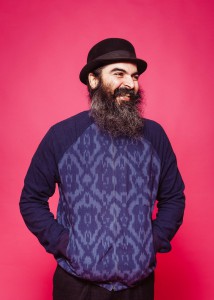Suket Dhir
Suket Dhir has been only the second Indian to win the Woolmark International Prize-the first was Rahul Misra, and that gives him entry into an elite niche of designers, considered the world’s best.
It has been twice as nice for India at the Woolmark’s International Prize. The esteemed award honours international fashion designers, creating a singular platform that recognises global fashion talent. In 2015, Rahul Mishra bagged India its first International Woolmark Prize, in the womenswear category. In 2016, Delhi-based designer, Suket Dhir was nominated in the menswear section. Just fresh out of showcasing his menswear collection at Lakme India Fashion Week, Suket gagged when he heard of his win. “I have never won a prize in my entire life!” he admits, embarrassed.
Yet, Dhir made up for the years he missed he missed out on landing the first prize at high school competitions with one single triumph – in January this year, Suket’s victory at the Woolmark’s International Prize in the Menswear Category placed him in a league of fashion designers that can be considered the best in the world. Apart from a prize kitty of AU$100,000 to further his brand, winning also means he gets to design a capsule collection created exclusively for Woolmark, stocked in some of the world’s most upscale boutiques – Isetan Mitsukoshi (Japan), David Jones (Australia), Saks Fifth Avenue (New York), 10 Corso Como (Milan) and Boon The Shop (South Korea), to name a few.

Suket’s showcase at the Woolmark awards was an ode to nostalgia for which he channelled his biggest style-icon; his grandpa. Dhir put together an ensemble that was inspired by his late grandfather’s garb, who he still worships as the best dresser in the entire world – an ombre shirt matched with a palazzo pyjama trouser, complemented by a matching wool jacket. His design featured prints from his grandparent’s vintage umbrella as motifs. Dhir depicted Indian summers as he drew on lazy afternoons spent at his grandpa’s mango orchard in Punjab, and green parrots that took flight from tree tops upon being startled. While the outfit had a very global and cosmopolitan feel, everything about the emotion it evoked was Indian. As Dhir proudly admits, “I wear my nationality on my sleeve.”
As a designer who is known to abhor skinny-fits, it still takes a brave man who is very secure in his masculinity to sport Suket’s designs. Far from conventional, Suket’s retro-bohemian creations are loose-fitting and more often than not, look back at the past. Neither does Dhir shy away from incorporating loud colours or big prints in his designs, “I don’t need to avoid prints to look manly,” he says, matter-of-factly.
The designer’s artistic leanings dwell in a romanticised past. “I like reminiscing of a bygone era – an age without machines, technology and the trappings of modern stressors. I find inspiration by looking back in time – it may be in an old family album, a movie from the 1920s or the Second World War,” Suket says. “There is also logic in sticking to classics,” the designer enlightens, “While double-soled shoes may be the rage at the moment, it will eventually return to single soles after a short-lived fad. Fashion is cyclical. It is always wise to stick to classics with quirky elements.”
Apart from his grandfather, Suket references unlikely style icons like Raj Kapoor and V.P. Singh and his artistic appetite is whetted by the strangest of memories – of a pre-independence era, of his school mess at Cambridge and the sounds of stones crunching his shoes on pebbled streets as his grandfather led him out on a morning walk. “The Gitas and the Vedas were discussed matter-of-factly at home.” Dhir explains. In fact, Linda Loppa, the Director of Strategy and Vision at Polimoda and one of the jury on Woolmark’s panel of judges recognised ethereal qualities in his work that even Suket wasn’t aware of. Loppa thought of Suket’s work as spiritual, something timeless and immortal that could be work over and over, time and time again.
Suket admits that while winning the Woolmark Prize has done wonders, not everything has been smooth-sailing. For an Indian designer to focus solely on menswear can be quite a challenge in India, especially since the moolah lies in designing for the fairer sex and in bridalwear, both of which Suket thinks aren’t his forte. His fashion focuses on men simply because he was forced to design clothes for himself when he could not find clothes and fabrics that matched his tastes. “I am fairly narcisstic – I am my own muse.” Suket laughs cheekily. “My early experiments with fashion only because I was very particular about what I wore, and most synthetic fabrics didn’t suit me at all which is why I started playing with natural fabrics.”
While creating a capsule collection for Woolmark is what is taking up most of Suket’s time these days, he reveals that sustaining his name as a global label is his current focus.



